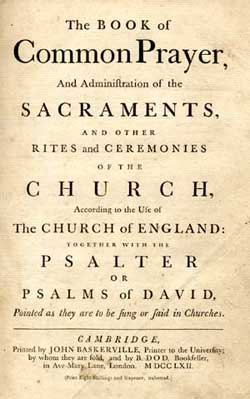 This year we celebrate 350 years of the Book of Common Prayer 1662. I am no strong advocate of its use. I think that some of its changes from previous books of common prayer were unwise. Nonetheless, many of its principles and rationales are deeply sound. There is much we can learn from it, embodying its principles into our different time and context. Let us pause a moment and pick up its preface. It is understood to have been written by the then bishop of Lincoln, Robert Sanderson (his draft was revised by a committee of bishops). I highlight some parts that may continue to be of value:
This year we celebrate 350 years of the Book of Common Prayer 1662. I am no strong advocate of its use. I think that some of its changes from previous books of common prayer were unwise. Nonetheless, many of its principles and rationales are deeply sound. There is much we can learn from it, embodying its principles into our different time and context. Let us pause a moment and pick up its preface. It is understood to have been written by the then bishop of Lincoln, Robert Sanderson (his draft was revised by a committee of bishops). I highlight some parts that may continue to be of value:
It hath been the wisdom of the Church of England, ever since the first compiling of her Publick Liturgy, to keep the mean between the two extremes, of too much stiffness in refusing, and of too much easiness in admitting any variation from it. For, as on the one side common experience sheweth, that where a change hath been made of things advisedly established (no evident necessity so requiring) sundry inconveniences have thereupon ensued; and those many times more and greater than the evils, that were intended to be remedied by such change: So on the other side, the particular Forms of Divine worship, and the Rites and Ceremonies appointed to be used therein, being things in their own nature indifferent, and alterable, and so acknowledged; it is but reasonable, that upon weighty and important considerations, according to the various exigency of times and occasions, such changes and alterations should be made therein, as to those that are in place of Authority should from time to time seem either necessary or expedient. …notwithstanding all the vain attempts and impetuous assaults made against it, by such men as are given to change, and have always discovered a greater regard to their own private fancies and interests, than to that duty they owe to the publick….
Our general aim therefore in this undertaking was, not to gratify this or that party in any their unreasonable demands; but to do that, which to our best understandings we conceived might most tend to the preservation of Peace and Unity in the Church; the procuring of Reverence, and exciting of Piety and Devotion in the Publick Worship of God; and the cutting off occasion from them that seek occasion of cavil or quarrel against the Liturgy of the Church. And as to the several variations from the former Book, whether by Alteration, Addition, or otherwise, it shall suffice to give this general account, That most of the Alterations were made, either first, for the better direction of them that are to officiate in any part of Divine Service; which is chiefly done in the Calendars and Rubricks: Or secondly, for the more proper expressing of some words or phrases of ancient usage in terms more suitable to the language of the present times, and the clearer explanation of some other words and phrases, that were either of doubtful signification, or otherwise liable to misconstruction: Or thirdly, for a more perfect rendering of such portions of holy Scripture, as are inserted into the Liturgy; which, in the Epistles and Gospels especially, and in sundry other places, are now ordered to be read according to the last Translation…
…we know it impossible (in such variety of apprehensions, humours, and interests, as are in the world) to please all; nor can expect that men of factious, peevish, and perverse spirits should be satisfied with any thing that can be done in this kind by any other than themselves…


